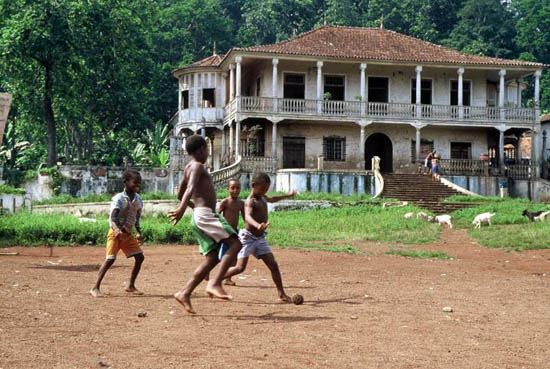Voltaremos na Gravana*
Texto de apresentação do Diário de Viagem a São Tomé:
"Amigo...amigo..." foi a frase que diariamente nos acompanhou ao longo das duas viagens que fizemos à Ilha de S. Tomé.
Além desta frase houve outras como "Branca...branca..." ou "Doce...doce...dá-me doce amigo". São crianças maravilhosas que foram bombardeadas por doces, dinheiro e outras coisas que os levam a quando encontram um turista a pedir.
A viagem foi magnífica pela aprendizagem que tivemos. Aprendemos a valorizar todos os minutos, os sons, as plantas, o sol, a noite, a comida que tínhamos, tudo...
Encontrámos um povo ainda oprimido pelo passado, com carências no campo da alfabetização, com dificuldades de integração, pouco empreendedores. Um povo perdido no oceano. Com o passar dos dias percebemos que dentro da sua desorganização eles organizam-se à sua maneira, à qual nós não estamos habituados.
Tivemos oportunidade de visitar praticamente toda a ilha de São Tomé e conhecer o legado histórico deixado pelos portugueses. Perceber como foi a história, como é constituída uma Roça e de ver que numa ilha de 80 km existe uma cultura diversificada, com dialectos diferentes e descendências variadas, desde Angolanos, Cabo Verdeanos, a Moçambicanos. Cada roça era um pequeno mundo, composto por uma escola, um hospital, uma igreja, as sanzalas e a casa do patrão, que normalmente ficava no ponto mais alto da roça.
Sentimos, que em cada lugar que entrámos, estávamos a viajar no tempo, as casas coloniais, a paisagem selvagem sem organização, os sons fortes e realistas dos animais ao nosso lado sem qualquer separação de nós, soltos. As vestes são qualquer tecido que sirva, não há modas para ninguém. A comida, a que cai da árvore.
Despedimo-nos com muita vontade de voltar, pelo ar que se respira, pela natureza que nos acolhe, pelo côncon do mar, pelo búzio do mato, pela omolete com ervas micôcô, pela piroga, pelas roças, pela barriga de peixe no contentor, pelos coqueiros, por querermos dar algo que possa ajudar no futuro de tantas crianças que nascem sem rumo.
*Gravana, estação do ano relativamente mais seca, que dura de meados de Junho a meados de Setembro.
Texto: Tânia Araújo

